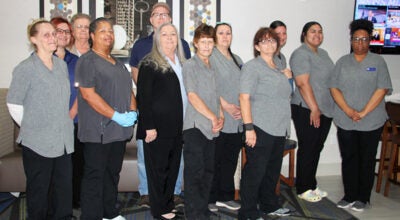County looks at $20M budget
Published 11:47 pm Wednesday, September 17, 2008
The numbers in the proposed $20.2 million county budget predict a tough economic situation for Covington County.
Commissioners, along with department heads, newly-elected commissioners and district hopefuls, met Wednesday for the first workshop for the 2009 fiscal year budget.
It is projected the county will receive $20,230,300 in revenue and pay out $20,245,600 in expenses. Despite the $15,000 difference, Chairman Greg White is calling the budget “balanced.”
“Even though it’s showing a $15,000 deficit, we just have shift a few things around,” he said. “We just ran out of time before today, but I expect that we will have the calculations finished by Monday.”
White said the county expects an increase in ad valorem collections for 2009, but projects 1-cent sales tax and gas tax collections to be flat.
The proposed budget does include a 3 percent across-the-board cost of living adjustment (COLA) for all county employees.
“We’re going to be struggling to make a balanced budget to be able to give employees the 3 percent raise,” White said. “It’s going to take trade-offs and we’re going to have to figure out where those trade-offs can come from. The money is there. We’re a few thousand off, but it’s there.
“You all know we were more than $250,000 over in the fuel budget this year,” White said. “I don’t know what to do there except to consolidate. What it’s going to take is a reduction of fleet and vehicles.
“As low as our cash reserve — even if we balanced this budget out to the penny — it’ll be tight,” he said. “It’s like living from paycheck to paycheck. Those last two days before payday are always rough. We have to look for ways to cut and conserve.”
Many attending the workshop posed questions about the county’s overall debt. White explained that while the numbers show a large outstanding debt, that debt can be attributed to capital outlay projects and equipment purchases — not money borrowed to cover operating expenses.
“Thirteen years ago, the county was $8 to $9.5 million in debt,” he said. “Today, we’re $17.5 million in debt — $5.4 million of that is in the arena lien, equipment costs have doubled and related debt has doubled. That’s what drives debt.
“It’s not us borrowing money to operate on,” he said.
Discussion during the workshop quickly turned to ways the county could eliminate debt and reduce overall expenses. White suggested converting the county from a “district system” to a “unit system.”
However, it is a decision that White will not have a part in making. White, a Republican, was defeated in June by Lynn Sasser in the primary election. Sasser will face Democrat Johnny M. Weed in November in a run off election. Weed attended Thursday’s hearing; Sasser did not.
“I’m going to leave a number of decisions to the new administration for November,” White said.
David Ellis, who will replace District 1 Commissioner Kent Colquett in November, said 25 of Alabama’s 67 counties have gone from a district system to a unit system.
Neighboring Elmore County utilizes a unit system where the commission employs a county engineer who supervises and directs the daily operations of the county’s road department. The engineer is responsible for the direction of all maintenance, construction, engineering and administration activities pertaining to the county’s road and bridge system.
“Elmore County did it and they saved $2 million last year. Crenshaw did too. I think they saved $1 million,” Ellis said. “As strapped as we are, we have to consider it.”
White said he too believes that “is the answer” to the county’s situation. Currently there are four districts within the county, each with their own operating equipment and employees.
“It is definitely something the new administration has to look at as quickly as they can,” he said.
White said he would not propose the county establish one central location for equipment and personnel for the county.
“The key is consolidating equipment,” he said. “We have to get that fleet down. We’re not putting the hours on the equipment to justify the expense. We need, what seven motor graders? We’ve got 10. We need to consolidate.”
The commission is expected to adopt the detailed 2009 fiscal year budget at its meeting on Monday, which will be held in the commission chambers at 9 a.m.




